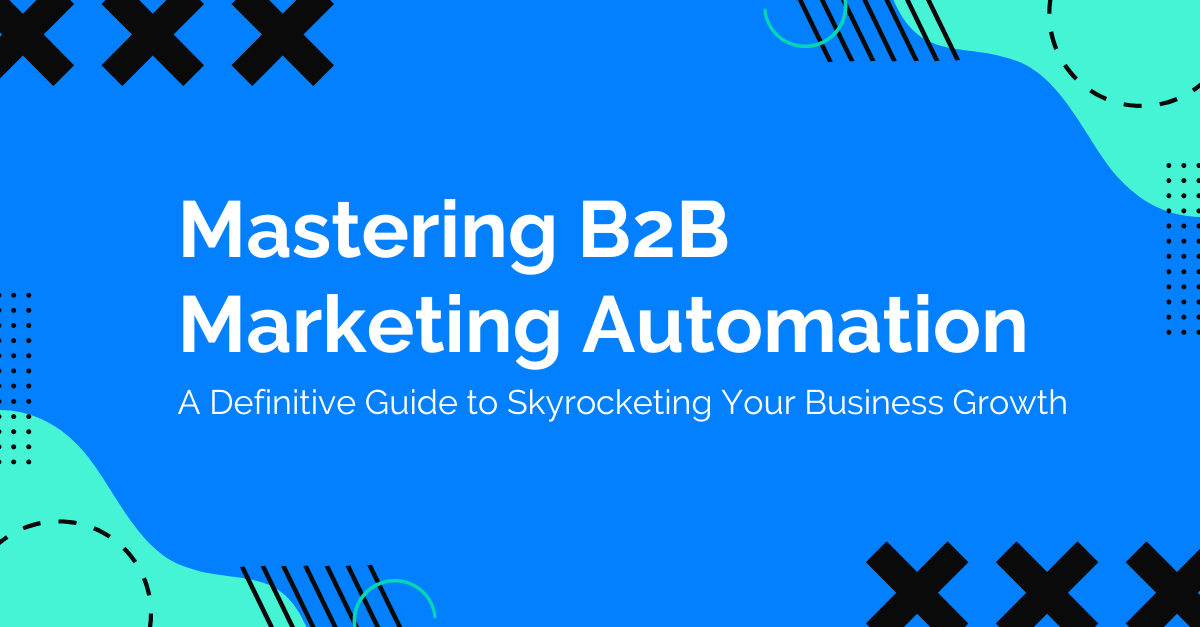In the fast-paced digital world, running a business without automation is like trying to paddle a boat against the current. When it comes to B2B companies, the story isn’t any different. Marketing tasks are increasingly complex, and the need for B2B marketing automation is more critical than ever. Let’s break down what B2B marketing automation is, why it’s crucial, and how it can transform your business operations.
What is B2B Marketing Automation?
At its core, B2B marketing automation is the use of technology to streamline, automate, and measure marketing tasks and workflows. This can dramatically improve operational efficiency and grow revenue faster. This process helps marketing automate repetitive tasks like email campaigns, social media posting, and even ad campaigns. As a result, it frees up your marketing team to focus on more strategic, high-level tasks.
Here’s a list of 10 leading platforms to consider for your platform:
- HubSpot: This tool excels in lead generation and allows businesses to create and automate detailed, personalized workflows.
- Marketo: Part of Adobe’s suite of products, Marketo offers powerful marketing automation software for companies wanting to streamline and measure marketing engagement.
- Pardot: A Salesforce product, Pardot provides a B2B marketing automation tool excellent in lead management and ROI reporting.
- Act-On: Offering a robust marketing automation platform with a user-friendly interface, Act-On is great for small and medium businesses.
- ActiveCampaign: Combining email marketing, marketing automation, sales automation, and CRM categories, ActiveCampaign provides small businesses a platform for managing and growing their customer base.
- Infusionsoft by Keap: Infusionsoft offers comprehensive marketing automation features designed for small businesses, particularly those with advanced sales and marketing automation needs.
- Sendinblue: As an email marketing automation tool, Sendinblue enables businesses to build and grow relationships with their customers.
- SharpSpring: Providing a fully integrated cloud-based platform, SharpSpring allows businesses to track customer behavior, drive more leads, and convert them to sales.
- Autopilot: A visual marketing software, Autopilot enables users to create customizable marketing workflows and automate their email, advertising, and sales processes.
- Ontraport: Ontraport offers a business automation software that integrates all your tools to empower you to organize, automate, and scale your business.
Why B2B Marketing Automation?
Why do we need marketing automation in the B2B landscape? There’s a simple answer: B2B companies are dealing with longer sales cycles, larger decision-making units, and a need for more personalized communication. B2B marketing automation helps to manage these complexities efficiently.
Enriching Customer Journeys
B2B marketing automation plays a significant role in creating personalized customer journeys. Remember the excitement when someone signs up for your newsletter? That’s your potential lead stepping into a customer journey. By using a B2B marketing automation platform, you can start an automated email or a series of drip campaigns. This process, known as lead nurturing, helps keep your prospects engaged by providing them with relevant information at each step of their journey.
A study by Forrester Research found that companies excelling at lead nurturing generate 50% more sales-ready leads at 33% lower cost. Moreover, nurtured leads make 47% larger purchases than non-nurtured leads.
This data underscores the power of lead nurturing in B2B marketing automation. By providing your leads with relevant content throughout their buying journey, you’re not only keeping your brand top-of-mind, but you’re also building a relationship and trust with your potential clients. This relationship-building makes them more likely to choose your company when they’re ready to purchase.
Channelize Your Marketing Efforts
Another crucial aspect of B2B marketing automation is the ability to manage multiple marketing channels efficiently. From email and social media to your website’s live chat, marketing automation platforms can integrate various channels. This integration provides a unified and consistent message across all platforms, creating a more personalized experience for your potential clients.
Enhance Lead Management
When your sales team works hand-in-hand with a powerful B2B marketing automation platform, lead management becomes a breeze. From the moment a prospective customer lands on your website, possibly attracted by an email campaign or a well-crafted landing page, their interaction is tracked in real-time. This tracking helps in scoring and grading leads based on their activities, providing valuable insights to your sales team. It empowers your team with the information necessary to tailor their approach, depending on the lead’s behavior and interests.
Optimize Marketing Campaigns
Perhaps one of the biggest advantages of B2B marketing automation is the ability to analyze and optimize your marketing campaigns. The platforms come with built-in analytics tools that can provide invaluable insights into your campaigns’ performance.
We’ve all heard the phrase, “what gets measured gets managed,” and it couldn’t be more true for marketing campaigns. Metrics offer tangible data points that help you gauge the effectiveness of your campaigns and optimize them for better results. Here are some key metrics you should consider:
- Conversion Rate: Conversion rates reflect the percentage of your audience that completes a desired action, like filling out a form. A low conversion rate might indicate that your call to action isn’t compelling enough or your landing page isn’t optimized for conversions.
- Bounce Rate: Bounce rate measures the percentage of visitors who leave your site after viewing only one page. A high bounce rate might suggest that your site isn’t user-friendly, your content isn’t engaging.
- Open Rate and Click-Through Rate (CTR): These metrics are especially important for email campaigns. The open rate indicates how many people opened your email, while the CTR tells you how many clicked on a link within the email. Low open or click-through rates might suggest that your subject line isn’t compelling, your content isn’t appealing, or your email isn’t properly formatted.
- Lead Generation Metrics: These metrics reveal how many leads your campaign has generated. If your campaign isn’t generating enough leads, it might suggest that your offer needs adjustments
By monitoring these metrics, you can draw actionable insights to optimize your campaigns, ultimately making your B2B marketing automation efforts more effective.
Create Dynamic Content
Another game-changer brought by B2B marketing automation is dynamic content. It’s content that changes based on the users’ behavior, preferences, or demographics. For example, a visit to a specific product page may trigger an automated email focused on that product. This type of personalization enhances user experience and significantly increases the chances of conversion.
This personalized approach is especially effective in account-based marketing (ABM). For instance, let’s say you have identified a specific company (or account) that you want to target. Using your B2B marketing automation platform, you can create personalized content tailored to that company’s specific needs or challenges.
One example could be a dynamic landing page. Once the specific target account visits your website, the landing page adjusts to address their particular industry issues, offer solutions tailored to their business, or even include testimonials from similar industries. This type of personalized content enhances the experience, making the user feel understood and valued, which ultimately increases the likelihood of conversion.
Improving Sales and Marketing Alignment
Marketing automation can improve the alignment between your sales and marketing teams. With lead scoring, the sales team knows exactly when to step in, avoiding leads slipping through the cracks. It also ensures the marketing team is only passing on sales-ready leads, saving the sales team valuable time and resources.
In Summary…
The world of digital marketing is rapidly evolving, and B2B companies need to adapt to stay competitive. B2B marketing automation can help simplify complex marketing tasks, provide insightful data for decision-making, and enhance customer journeys. It aligns the efforts of the sales and marketing teams, while creating a more personalized experience for prospective clients.
B2B marketing automation isn’t just a fad, it’s a necessity for any B2B company looking to optimize its marketing campaigns and drive business growth. If you’re not already harnessing its power, it’s time to explore the benefits of B2B marketing automation and revolutionize your marketing strategy. Because in the end, it’s all about delivering the right message, at the right time, to the right person, and marketing automation makes that possible.




